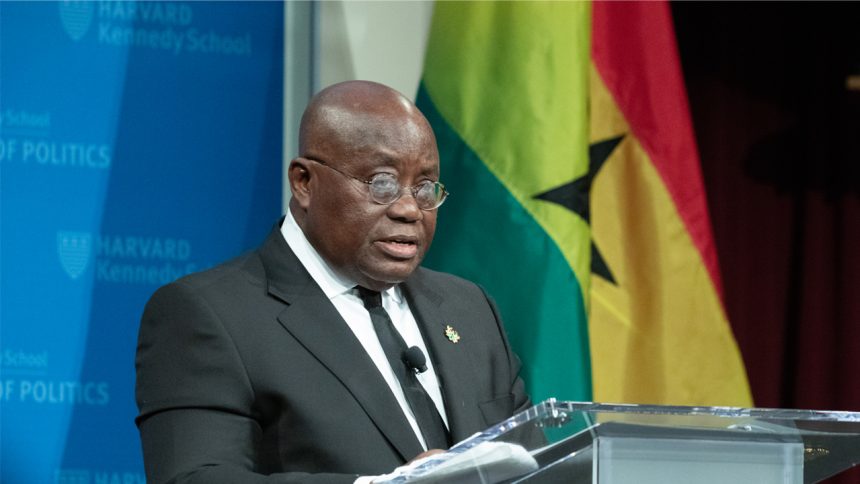Former Ghanaian President Nana Akufo-Addo on Monday declared that corruption remained Africa’s biggest governance challenge and a significant threat to development, despite progress in institutional reforms being initiated across the continent.
This former Ghanaian President stated this in Abuja at a lecture delivered at Nigeria’s National Defence College (NDC) in Abuja on Monday, as part of activities marking the graduation ceremony for Course 33.
He pointed out that although several African nations had set up anti-corruption agencies, many of such agencies were weakened by political interference, underfunding and lack of independence.
“In 2023, more than two-thirds of African countries scored below 50 out of 100 on Transparency International’s Corruption Perceptions Index. Yes, we have anti-corruption agencies across the continent, but too often they are deprived of resources or stripped of real autonomy.
“Still, examples from Rwanda and Botswana show how independent, well-resourced bodies can make a real difference,” he said.
He stressed that corruption was not only an ethical issue but a fundamental threat to development, as it eroded public trust, diverted resources, and crippled service delivery.
According to him, the fight against corruption requires political will, strong laws, citizen engagement, and technological innovations that close loopholes in public finance and procurement.
“Technology, from open contracting portals to blockchain, can help strengthen accountability and expose fraud. Citizens must also be empowered as watchdogs in the governance process,” he added.
He further explained that addressing corruption was central to bridging Africa’s governance gap, which is also worsened by insecurity, weak democratic cultures and donor dependence.
He said that strong institutions, judiciaries, legislatures, electoral commissions, civil services and civil society organisations must be given real independence if Africa was to sustain democratic governance and development.
“The task before us is urgent. Together, let us build institutions worthy of our people’s aspirations and resilient enough to secure Africa’s future.”
Speaking, the Minister of Defence, Mohammed Badaru, who is the special guest of honour, stated the Renewed Hope Agenda of the present administration was strengthening institutions for effective governance in the country
The Minister pointed out that under President Bola Ahmed Tinubu’s Renewed Hope Agenda, Nigeria is committed to strengthening institutions for efficient governance.
According to the minister, the Tinubu administration’s efforts to strengthen institutions include leadership appointments, reforms, and new frameworks deliberately designed to promote accountability, professionalism, and effective coordination.
“In alignment with the President’s mission, the Ministry of Defence is focused on building systems that will outlast any administration and secure stability for future generations.”
The Minister pointed out that the theme of the lecture, “Strengthening Institutions for Good Governance in Africa,” goes to the very heart of our continent’s future. He emphasised that when institutions are weak, nations falter, and when institutions are strong, nations endure, economies grow, and societies thrive.
“Strong nations are not built on strong individuals, but on resilient and accountable institutions,” he said.
The minister noted that despite efforts to deepen good governance and institutional resilience across Africa, peace, security, and development require deeper cooperation and stronger institutions. Nigeria, he added, stands ready to lead through domestic reforms and contributions to Africa’s collective renewal.
He charged the graduating participants of Course 33 to embrace their leadership responsibilities, noting that their 11-month training had prepared them to think strategically, act decisively, and lead with dignity.
According to him, “your task is to strengthen the institutions you serve, for institutions only endure when leaders uphold fairness, accountability, and service to the people.”
Also speaking, the Commandant of the NDC, Rear Admiral James Okosun, said that the graduation lectures were a long-standing tradition of the College to provide an opportunity to engage distinguished leaders whose lives and service exemplify excellence.
According to him, “It also serves to inspire and challenge our participants as they prepare to assume higher responsibilities within their services, ministries, departments, agencies, and other strategic institutions,” he said.
The lecture with the theme, “Strengthening Institutions for Good Governance in Africa”, was attended by the Minister of Defence, Mohammed Badaru, the Chief of Defence Staff (CDS), Gen. Christopher Musa, Chief of Naval Staff, Admiral Emmanuel Ogalla, government officials, members of the diplomatic corps, and defence stakeholders from Nigeria and across Africa.
ALSO READ TOP STORIES FROM NIGERIAN TRIBUNE
WATCH TOP VIDEOS FROM NIGERIAN TRIBUNE TV
- Let’s Talk About SELF-AWARENESS
- Is Your Confidence Mistaken for Pride? Let’s talk about it
- Is Etiquette About Perfection…Or Just Not Being Rude?
- Top Psychologist Reveal 3 Signs You’re Struggling With Imposter Syndrome
- Do You Pick Up Work-Related Calls at Midnight or Never? Let’s Talk About Boundaries






